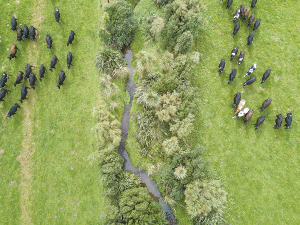Urgent action needed to restore Waikato lakes' health
Waikato is home to a diverse range of lakes, and experts say they urgently need better management and restoration.
 While the Government is changing the National Policy Statement on Freshwater, regional councils are implanting regulations already on the books.
While the Government is changing the National Policy Statement on Freshwater, regional councils are implanting regulations already on the books.
Beef + Lamb NZ is calling on the Government to take urgent steps to stop regional councils from continuing to implement the existing National Policy Statement on Freshwater.
B+LNZ's general manager for Policy and Advocacy, Dave Harrison, told a roadshow meeting at Oxford that while the Government intends changing the National Policy Statement in about a year, the regional councils in the meantime have no choice but to continue to implement the regulations already on the books.
"So, we have a government that is saying 'look actually fellas, you should probably hit pause on this because we're going to change everything and you're just going to have to do it again, and that doesn't make a lot of sense'.
"And the councils are saying, 'well we kind of can't, because the law requires us to be implementing what's on the statute books, so we're stuck between a rock and a hard place'."
The Government needed to fix it to prevent the adverse impacts of the current rules becoming ingrained in the regional planning processes in the longer term, says Harrison.
He says the issue was one of three big environmental matters that are now live or soon would be, and he was asking farmers attending the roadshow for their input into how they would like B+LNZ to tackle them.
Another was the Government's intention to replace all the RMA framework.
It had already made some "quick gains" such as enabling fast tracking of consenting, and changes now in front of Parliament would also take away some "real friction points for farmers" such as waterway stock exclusion and low slope rules.
However, it would still take a couple of years to amend the whole of the regulatory framework.
Harrison says it was in no-one's interest for policy to swing back and forth every three, six, or nine years and B+LNZ was calling for something that was enduring so farmers could make plans and know what the framework would be, going forward.
B+LNZ was also asking for a review of the national bottom lines for freshwater, which establish limits on the maximum amounts of contaminants in a waterway, such as suspended sediment and E. coli.
If a waterway had more sentiment than allowed by the national bottom line, the regional council had to set rules and a time frame for bringing it into compliance again - or, said Harrison, potentially bringing it into a state of compliance where it had never been before.
B+LNZ commissioned an independent report into the methodology used to develop the bottom lines and it identified some significant issues.
Harrison notes that the first flaw was that the data sets did not align. Data on fish stocks came from the 1970s up to today, but the data on sediment levels came only from modelled and current data.
Harrison said that was then used to assume the impact that sediment had on fish stocks, but the correlation was not established, since there was no sediment data from the 1970s. The report also questioned whether relevant species of fish were being counted.
Another issue was that large numbers of native catchments, such as in the DoC estate, do not meet the bottom lines despite being untouched by agriculture.
Thirty eight per cent of catchments, if agriculture was removed and they reverted to a natural state, also would not meet the standard, says Harrison.
Attempting to implement the bottom lines would be impossible and an unacceptable cost to the sector and to the country, he warns.
Controls on the movement of fruit and vegetables in the Auckland suburb of Mt Roskill have been lifted.
Fonterra farmer shareholders and unit holders are in line for another payment in April.
Farmers are being encouraged to take a closer look at the refrigerants running inside their on-farm systems, as international and domestic pressure continues to build on high global warming potential (GWP) 400-series refrigerants.
As expected, Fonterra has lifted its 2025-26 forecast farmgate milk price mid-point to $9.50/kgMS.
Bovonic says a return on investment study has found its automated mastitis detection technology, QuadSense, is delivering financial, labour, and animal-health benefits on New Zealand dairy farms worth an estimated $29,547 per season.
Pāmu has welcomed ten new apprentices into its 2026 intake, marking the second year of a scheme designed to equip the next generation of farmers with the skills, knowledge, and experience needed for a thriving career in agriculture.